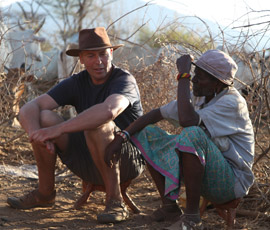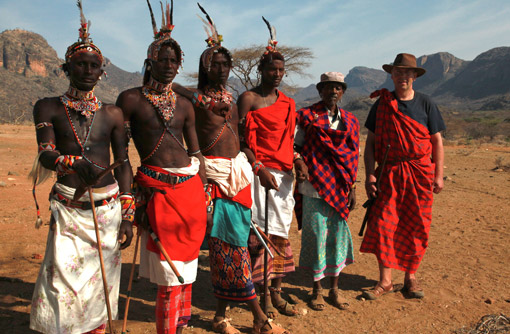Farmer swaps Devon dairy for Kenyan tribe in BBC documentary

A Devon dairy farmer is set to star in a BBC2 documentary after spending a week with a remote tribe of Kenyan farmers.
Richard Gibson from Nether Woodburn Farm in Tiverton, north Devon, was flown 6,000 miles to a remote village in northern Kenya to experience life with the Samburu tribe.
His journey was filmed for an episode of The Toughest Place to be a… – a BBC documentary that follows ordinary British workers doing a tougher version of their job in another country.
At home in Devon, Richard lives with his wife Heather on an 80ha farm, where they run a herd of 120 dairy cows.
Over in Kenya he was tasked with helping find food and water to maintain 30 cattle and 70 goats in a country that hasn’t seen rain for a year. All the while protecting the herd from the threat of hyenas, lion attacks and cattle raiders.
Richard heard about the programme one morning in August, when a letter from the BBC dropped through his door appealing for farmers to apply for the series.
“My immediate reaction was no – I can’t afford the time away,” said Richard. But just a few hours later it was a very different story.
“It had been pouring down with rain all day, I came in at 3pm totally fed up and Heather said ‘go on, ring them up’.”
After a rigorous selection process, Richard got the call to say he had been selected for the show.
“I think Heather was even more shocked than me,” said Richard. “She only told me to apply to stop me moaning about the weather.”
Just one month later Richard touched down in Nairobi with a three-man production and camera crew. After catching another internal flight, they still had another nine-hour car journey to reach the village.
“The dogs sounded like wolves, I could hear hyenas all night and then the chanting started in the village – I started to wonder if they had a pot lined up for me. I just sat there with my mouth open thinking ‘what have I done?'”
Richard Gibson
When he finally arrived at the village late at night, Richard was starting to feel apprehensive.
“The dogs sounded like wolves, I could hear hyenas all night and then the chanting started in the village – I started to wonder if they had a pot lined up for me. I just sat there with my mouth open thinking ‘what have I done?'”
Richard spent most of the week with a Samburu elder and his family. He lived in the same traditional conical huts as the rest of the tribe – thatched and lined with goatskin – and quickly became accustomed to the relentless search for water in temperatures that frequently topped 40C.”One day I had to dig a well with the warriors. It was a kilometer-wide riverbed and it was just dry – it took your breath away. We had to dig out down 4ft just to get a puddle of water.”

Despite the heat and overwhelming dryness, Richard was surprised at the condition of the animals.
“They look terrific. If the water goes off on my farm it only takes an hour for the cows to start shouting, but their cattle aren’t even guaranteed to drink water every day.
“We think the elements are against us, but if I’ve learnt anything it’s that you can’t have too much water.”
The lack of food and water was much more evident in the herd’s milk yields. If they got half a litre out of a cow a day it was considered “pretty good”.
But despite the heat and the hardships, Richard says the Samburu have plenty to be envious of – not least their close-knit community.
He describes how people sit and talk for hours about elephants they’ve seen, sharing information and knowledge. “They also don’t have any bills and the constant pressures of 21st century living – the phones going and all the red tape,” he says.
Back on English soil, Richard’s Kenyan experience has left a lasting impression.
“I felt very ‘Western fat cat’ at the start of the programme but I really enjoyed doing something different. I don’t want life to slip by and have just spent my life on the farm.”
To that end, he’s in the process of setting up a charity project to install a borehole in the village he visited.
“I thought my job was hard before I went and I still do. But even in a bad year we know we’ll be there for another year and people are fed – the Samburu find it hard to look to next week unless they can find water.”
The Toughest Place to be a Farmer will be shown at 9pm, Sunday 17 March on BBC2. Go to aidforsamburu.org.uk to find out more about Richard’s charity or text ASAM13 to 70070 to make a JustGiving donation of £1 – £10.
Read more features from our Rural Living section.
